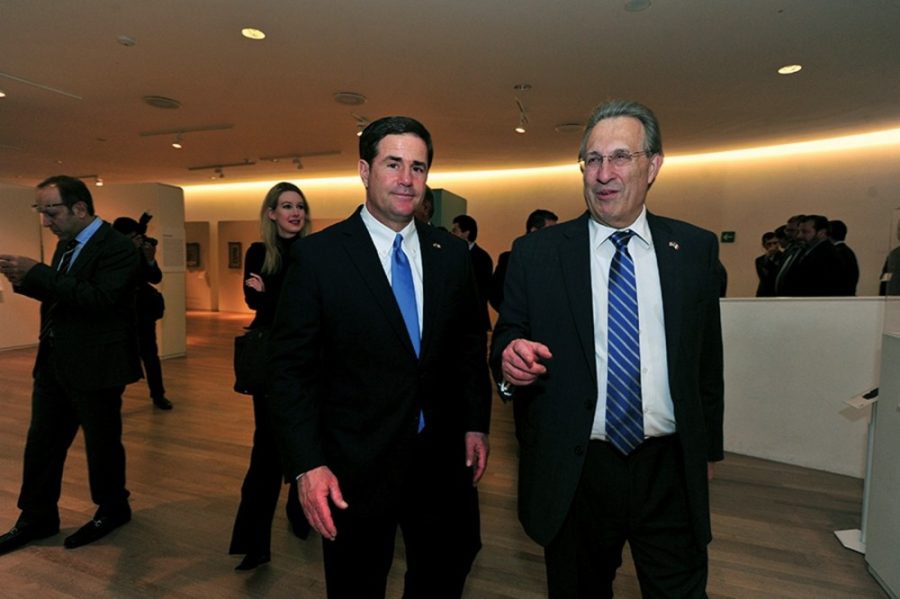Arizona began its 53rd legislative session at the state capital on Jan. 9. After the November elections, republicans maintained control of both the state House and Senate.
Gov. Doug Ducey, in his State of the State address, presented his legislative agenda for the new year. Many of Ducey’s proposals focused on increasing funding for education.
“I will call for an increased investment in our public schools above and beyond inflation every single year I am governor,” Ducey said during the speech.
Ducey previously outlined his plan to spend an additional $1.8 billion on K-12 education in a press release. Ducey promised salary increases and bonuses for teachers as well as loan forgiveness for STEM teachers and all-day kindergarten for residents.
“Without a doubt, schools in low-income areas are the ones that really need our focus—and that’s what my budget prioritizes,” Ducey said.
Absent from Ducey’s speech was a plan for Arizona’s public universities.
“Ducey went the entire speech never substantively mentioning higher education,” said Jo Holt, chair of the Pima County Democratic Party.
Over the past decade, the legislature’s cuts to state funding have contributed to increased university tuition rates paid by in-state students, Holt said.
Public universities are strongly tied to the local economy and Holt believes continuing to weaken these institutions will result in negative economic ramifications.
“If you are serious about improving education in Arizona, you have to look at higher education,” she said.
RELATED: AZ Repubs and Dems can agree on one thing: Tuition needs to be as low-cost as possible
The Arizona Board of Regents, the governing body of Arizona’s public universities, plans to lobby the state legislature in order to achieve their goals as outlined in their IMPACT Arizona plan.
In a board meeting held last year at UA, Regent Ron Shoopman said the goal of covering 50 percent of in-state student tuition by 2020 must be placed at the forefront of the regents’ short-term legislative agenda.
“Every legislature wishes they had more revenue,” said Regent Rick Myers at the meeting.
Public universities can enhance that revenue by providing an adequately educated workforce, Meyers said.
Meyers said he understands the short-term need to fix potholes, but believes increasing tuition coverage will benefit the state long term.
Apart from the board of regents, UA students also plan to lobby the state legislature to increase funding to Arizona’s public universities.
Michael Sistak, UA director of advocacy and community engagement, organized the “Fund Arizona Students” campaign.
The campaign gathered short, selfie videos from UA alumnus, parents and students stating why they believe state legislators should fund public universities.
“The idea is to collect these videos, post them on social media several times a week, and send them to legislators to drive up our engagement with supporters and drive the message home with lawmakers,” Sistak said in an email to students.
UA students will be traveling to the Arizona State Capitol Jan. 18 to participate in Cats at the Capitol.
Cats at the Capitol is the UA’s kickoff event for all of our advocacy efforts during the legislative session,” AdvoCats, UA’s alumni advocacy group, said in a email to students.
During the trip, UA students will hear from President Ann Weaver Hart, receive advocacy training from lobbyists, have a chance to ask state lawmakers questions and meet with legislative leaders.
“Currently, the state commits to approximately 34% of this cost. Using a three-year ‘phase-in’ process, the universities are asking the state to increase investment by roughly $77.8 million per year to fully establish the new model,” a press release from the AdvoCats says.
They encourage UA students to attend state Capitol meetings, send letters to their legislators and engage their communities in order to help increase legislative funding for UA.
University funding is not the only issue on UA student’s minds.
Jude Udeozor, president of UA’s Graduate and Professional Student Council, introduced a plan to write to congressional members in support of Deferred Action for Childhood Arrivals students on campus at a Jan. 9 executive board meeting.
Jasmine Sears, GPSC administrative vice president, hopes the Arizona Legislature and the regents will adopt a state policy to protect DACA students should a federal repeal occur.
RELATED: GPSC Executive Board to write in support of DACA students, allow members to recuperate fall stipend
In his policy speech, Ducey discussed many non-education related issues students can voice their opinions on this year. He has promised to assemble a team to examine Arizona business regulations.
“Our team will do the research, and if a rule or regulation is not protecting consumers, public safety or public health, it’s time for it to go,” Ducey said.
Students also have the opportunity to voice their opinions on issues Ducey did not address. According to Holt, the legislature must address economic inequality.
“Corporations do not understand they are shooting themselves in the foot by taking so much wealth out of the middle class. It is not a sustainable design for an economic program,” Holt said.
Students can find information on their state legislators and their right to request to speak on the Arizona State Legislature’s website.
Follow Randall Eck on Twitter.








